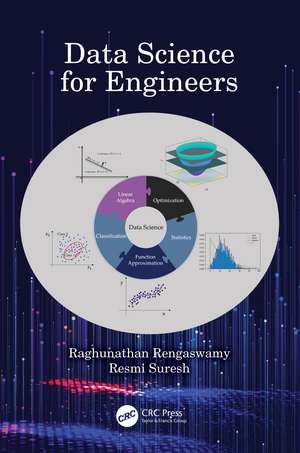Data Science for Engineers
Autor Raghunathan Rengaswamy, Resmi Sureshen Limba Engleză Hardback – 16 dec 2022
The book-
- Provides a systematic approach for understanding data science techniques
- Explain why machine learning techniques are able to cross-cut several disciplines.
- Covers topics including statistics, linear algebra and optimization from a data science perspective.
- Provides multiple examples to explain the underlying ideas in machine learning algorithms
- Describes several contemporary machine learning algorithms
Preț: 643.57 lei
Preț vechi: 707.22 lei
-9% Nou
Puncte Express: 965
Preț estimativ în valută:
123.14€ • 128.57$ • 101.92£
123.14€ • 128.57$ • 101.92£
Carte disponibilă
Livrare economică 15-29 martie
Livrare express 01-07 martie pentru 43.62 lei
Preluare comenzi: 021 569.72.76
Specificații
ISBN-13: 9780367754266
ISBN-10: 0367754266
Pagini: 360
Ilustrații: 35 Tables, black and white; 108 Line drawings, black and white; 1 Halftones, black and white; 109 Illustrations, black and white
Dimensiuni: 156 x 234 x 27 mm
Greutate: 0.83 kg
Ediția:1
Editura: CRC Press
Colecția CRC Press
ISBN-10: 0367754266
Pagini: 360
Ilustrații: 35 Tables, black and white; 108 Line drawings, black and white; 1 Halftones, black and white; 109 Illustrations, black and white
Dimensiuni: 156 x 234 x 27 mm
Greutate: 0.83 kg
Ediția:1
Editura: CRC Press
Colecția CRC Press
Public țintă
Postgraduate, Undergraduate Advanced, and Undergraduate CoreCuprins
Chapter 1. Introduction to DS, ML AI
Chapter 2. DS and ML - fundamental concepts
Chapter 3. Linear algebra for DS and ML
Chapter 4. Optimization for DS and ML
Chapter 5. Statistical foundations for DS and ML
Chapter 6. Function approximation methods
Chapter 7. Classification methods
Chapter 8. Conclusions and future directions
References
Index
Chapter 2. DS and ML - fundamental concepts
Chapter 3. Linear algebra for DS and ML
Chapter 4. Optimization for DS and ML
Chapter 5. Statistical foundations for DS and ML
Chapter 6. Function approximation methods
Chapter 7. Classification methods
Chapter 8. Conclusions and future directions
References
Index
Notă biografică
Raghunathan Rengaswamy is the Marti Mannariah Gurunath Institute Chair Professor, Dean Global Engagement, and a core member of the Robert Bosch Center for Data Science and AI (RBC-DSAI) at IIT Madras. He is a co-Founder and Director of three IITM incubated companies. Raghu’s work is in systems engineering, data science, ML and AI techniques. His work in these areas has resulted in more than 140 international journal papers, one textbook, two US patents, several conference papers, and presentations. His work has been well cited and scores of students have gone through his MOOC courses: "Data Science for Engineers" and "Python for Data Science". He has received awards for his research: Young Engineer Award for the year 2000 awarded by INAE, the Graham faculty research award at Clarkson University in 2006. He has also received teaching awards: Omega Chi Epsilon professor of the year award at Clarkson in 2003, and Dr. Y.B.G. Varma award for teaching excellence at IIT Madras in 2018. He was elected a fellow of Indian National Academy of Engineering in 2017.
Descriere
With tremendous improvement in computational power and availability of rich data, almost all engineering disciplines are using data science in one way or another. This textbook present material on data science comprehensively and in a structured manner.
